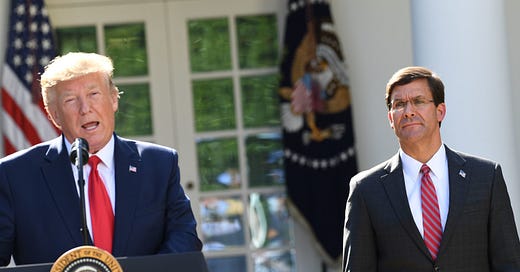On October 13, Secretary of Defense Mark Esper appeared on Fox News Sunday with Chris Wallace, sentencing himself to interrogation by a sharp political journalist. The interview centered on the American withdrawal from Syria and the green light that President Trump appeared to give Turkey to move in and crush the Kurds (an appearance the president now denies). The president made his Syria decision without consulting Esper and in direct contradiction to the approach Esper had been pursuing with Turkey. This explains why, during the Fox News interview, Esper looked so uncomfortable that one might have thought that he was a prisoner of war giving a forced confession.
What do you do if you are Mark Esper? Esper—or “Esperanto,” as the president called him on Twitter this past weekend—is a smart man (he holds a Ph.D. in political science, with a focus on security studies) and is aware of the grim consequences of the president’s rash Syria decision. He has been the secretary of defense for only three months (after having briefly served in the position in an acting capacity). His predecessor, James Mattis, resigned from his position in late 2018 after the president announced on Twitter that he was ending America’s mission in Syria, a decision that the president later rescinded—he was for the withdrawal before he was against it, until he was for it again, and he will probably be against it again.
So, once more: What do you do if you are Mark Esper? If he is, as those who know him have tended to say, a decent man, how should he respond to Trump’s thoughtless undermining of his diplomatic work and initiating the bloody Turkish invasion now underway?
Alas, Esper is doomed if he leaves and doomed if he stays.
The staying part is obvious. Whatever comes out of the U.S. withdrawal from Syria—a Kurdish genocide, a resurgence of the Islamic State, an expansion of Iran’s sphere of operations and influence, a renewal of the migrant crisis in Europe, and most likely all of the above and more—it doesn’t look pretty. It is conceivable that Esper’s presence will help prevent or mitigate some of the bad outcomes—indeed, it is likely that Esper deserves credit for the president’s too-late attempt to walk back his Syria blunder—but all that is happening will have Esper’s signature on it as the secretary of defense who led the withdrawal.
But what if Esper joins the list of officials to quit the Trump administration in frustration? For a decade now, thanks to Barack Obama, Donald Trump, and congressional Republicans, the U.S. military has been bleeding as we move closer to a great power war. We hear a lot about military spending, but our civilian leaders are paying little attention to the structure and posture of U.S. forces. One should not put too much stock in wargaming, but in a recent Department of Defense-sponsored war simulation against Russia and China, the United States “got its ass handed to it.” Such wargaming losses are the norm and not the exception: For a decade, America lost every single simulation against Russia in the Baltics.
Speaking of Russia, the latest developments in Turkey have implications on this front, too. Turkey’s military is heavily equipped with American military materiel. As Turkey moves toward a closer alignment with Russia and away from Europe and the United States, officials worry that this drift could lead to Turkey’s sharing of secret American military capabilities with Russia. And the new sanctions on Turkey that Trump has put it place this week as a belated attempt at ameliorating his gross error will be an own-goal—the sanctions will push Turkey further into Russia’s arms, and will likely give Turkey’s Erdogan incentive to release Syrian refugees into Europe, creating another refugee crisis that will vex Europe and strengthen Putin’s hand. Esper is very well aware of these challenges.
So, given the stakes, to what extent should we expect the civilian leaders at the Department of Defense to resign in objection and leave their important positions to be filled by political hacks who will protect Donald Trump and advance their careers on Sunday shows instead of strengthening our military capability to face present and future crises? It may make a powerful headline—Secretary of Defense Quits After Just Three Months in Objection to Trump’s Syria Withdrawal—but will anyone remember it a few days later? Would Esper’s resignation make U.S. defense policy any wiser? Maybe: Trump changed his mind about Syria after Mattis resigned, but correlation doesn’t mean causation. On the other hand, nobody decent likes to have “did nothing to prevent a genocide” on his resume.
There is no good answer for Esper or any other decent public servant in this administration. This is not to say that, like some in Vichy France, many people are not fooling themselves that they are there for the greater good while serving the devil. But everybody deserves the benefit of the doubt. Secretary Esper and all other decent men and women who work for this administration are in a tough position.
Nobody should have to choose between signing off on genocide and doing nothing to prepare his country for World War III. But that’s the kind of choice Donald Trump leaves his subordinates.




